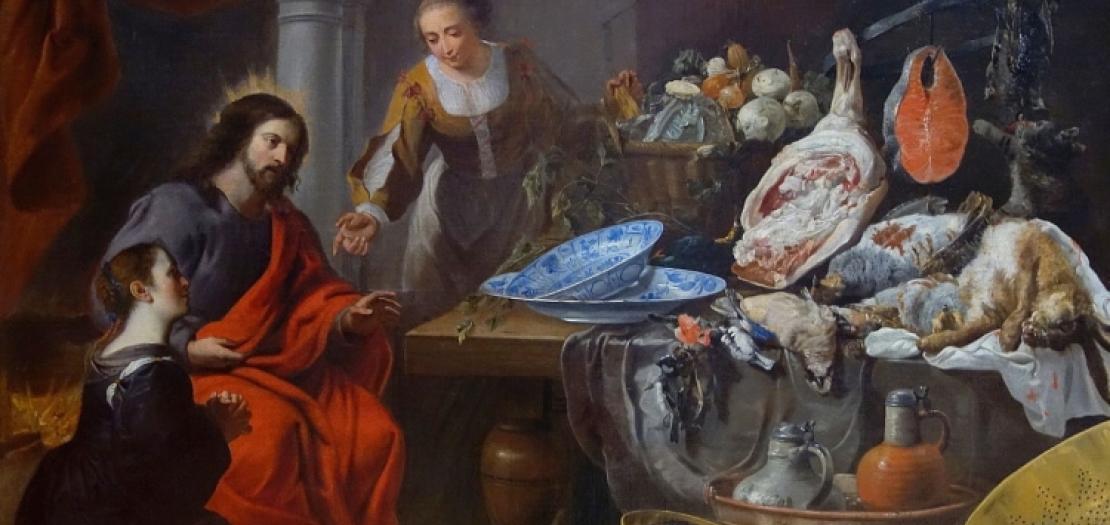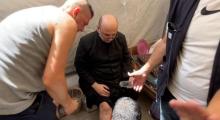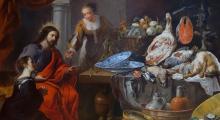Issued by the Catholic Center for Studies and Media - Jordan. Editor-in-chief Fr. Rif'at Bader - موقع أبونا abouna.org

Following is the text of the meditation by His Beatitude Cardinal Pierbattiasta Pizzaballa, Latin Patriarch of Jerusalem, on the 16th Sunday of Ordinary time, dated July 20, 2025:
In salvation history, something new happens every time the Lord enters a person’s home and life.
It can happen that an ordinary man or woman becomes a leader (like Moses, for example), that a barren woman becomes pregnant (like Sarah), that a dead person is resurrected (like Lazarus), that the story, in short, takes a completely different turn...
When this happens, we usually find ourselves on the brink of despair: a people long enslaved and exhausted, a barren couple without hope, enemies who humiliate and leave no escape. This happens so that it becomes clear that it is God who works salvation. And it is also clear that God intervenes gratuitously, without asking for anything in return. He chooses a people, a family, a person precisely because of their poverty, their need for salvation, because he loves them.
It is never an easy, immediate or obvious path: it usually leads through a crisis, because it is about leaving something old and opening up to something new; because it is above all about believing, as Abraham teaches us.
Today we see all this in the house of two sisters, Martha and Mary. (Luke 10:38-42)
Jesus enters their house, because this is what the Lord does: He comes, He enters, He makes Himself a guest. He asks for nothing, unlike all the great men of the world. He comes out of friendship. He not only asks for nothing, but when He comes, He gives something that only He can offer, His Word, Himself.
And so it is that Mary welcomes Him in this way, by welcoming the Lord and letting Him give His Word.
Mary welcomes Him by listening to Him, because there is no other way to welcome the Lord (“She had a sister named Mary, who sat beside the Lord at his feet listening to him speak. (Luke 10:39)
Martha, on the other hand, wears herself in doing something to welcome and to be welcomed (“Martha, burdened with much serving”. (Luke 10:40) She does something that no one has asked her to do and for which there is no urgency. When the Lord enters a person’s life, the order of priorities changes, and the first thing everyone needs is to know Him and meet Him, everything else comes after that.
If, on the other hand, we put other things first and justify ourselves on the grounds that they are necessary, then only evil results. The evangelist Luke lists some of them.
The first is that Martha is “burdened”, (Luke 10:40) i.e. involved in something else. It is not Martha who decides what to do, but the things that need to be done decide for her. And this is exactly the opposite of the verb used for Mary, who instead “chooses” (“Mary has chosen the better part”, (Luke 10:42) that is, she is free to remain in what she thinks is good.
The second point is loneliness: Martha complains about being left alone, and she feels that no one, not even the Lord, really cares about her (“Lord, do you not care that my sister has left me by myself to do the serving?” (Luke 10:40) If you lose the essentials, you lose communion; the other person, even if it is your own brother, is perceived as an enemy who is taking something away from you.
Mary, on the other hand, takes nothing away from Martha, because the Word of the Lord is an inexhaustible source that is sufficient for all.
Finally, Martha takes the Master's place: not only does she not listen, but she tells him what to say, how to speak: “Tell her to help me.” (Luke 10:40)
Martha, on the other hand, although confused, has the courage to turn to the Lord and ask him for help. Her greatness lay in addressing this question directly to Jesus. This is a first step to being healed so that our relationships can be evangelized.
Every fraternal bond that exists between brothers, between clans, between ethnic groups, between peoples and between nations must be evangelized, otherwise it lives only from fear of the other. To evangelize a bond means to bring it back to its essence, to what Mary chose for herself.
Mary simply chose to believe, just like Abraham in the first reading. To believe that when God enters a home, i.e. a person’s life, he brings new life, a new perspective.
The life that God gives is enough for all and cannot be taken away (“Mary has chosen the better part and it will not be taken from her”. (Luke 10:42)
So, the Lord does not replace Martha in resolving the family conflict, but shows her a way in which every conflict and every failure can find peace, and life can unfold. It is a path on which he is reborn.
It is not about dividing up the tasks to be done equally, but about choosing what is essential, listening to his word and marveling together when the Lord comes in his own house to give one a fulfilled life.
+ Pierbattista







